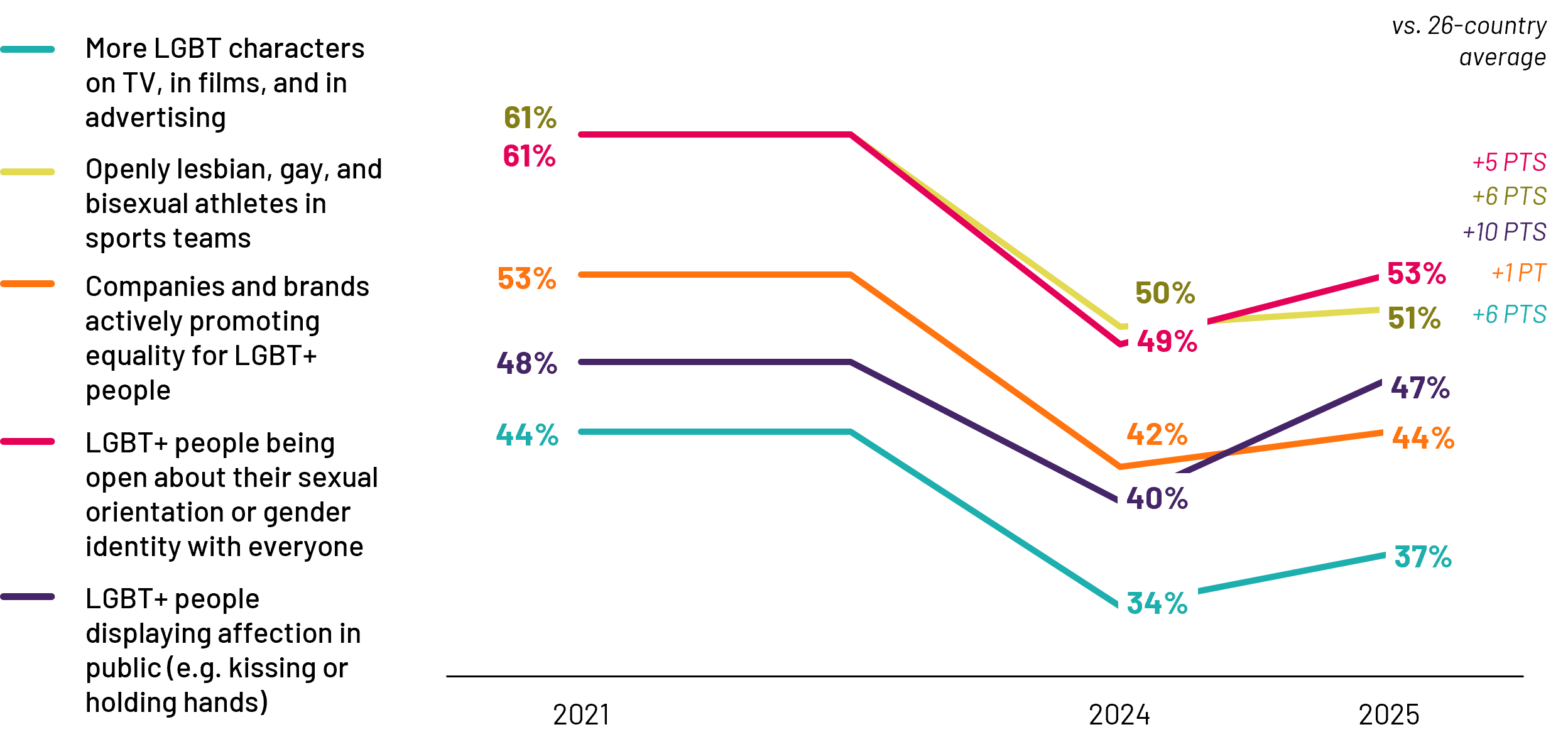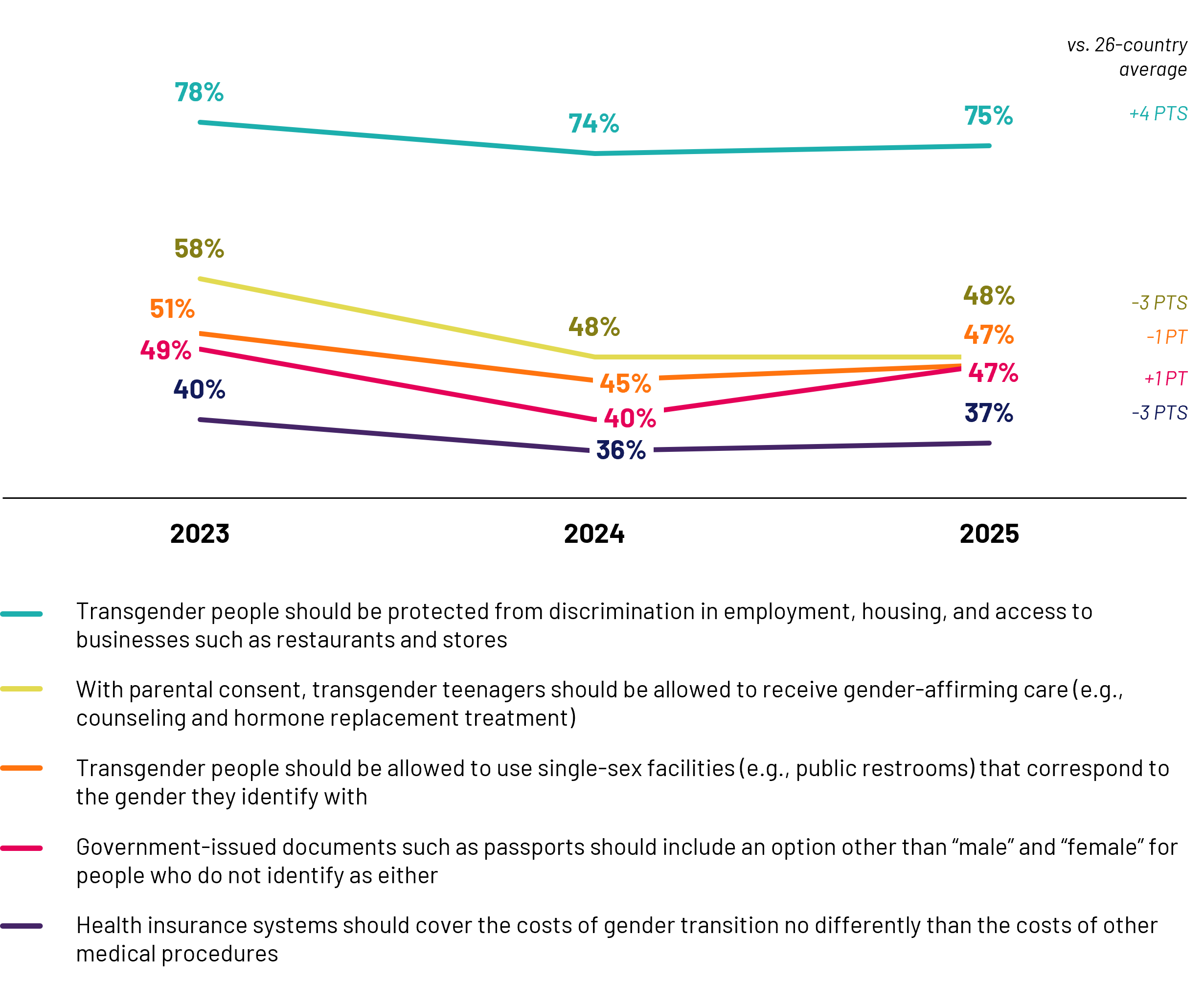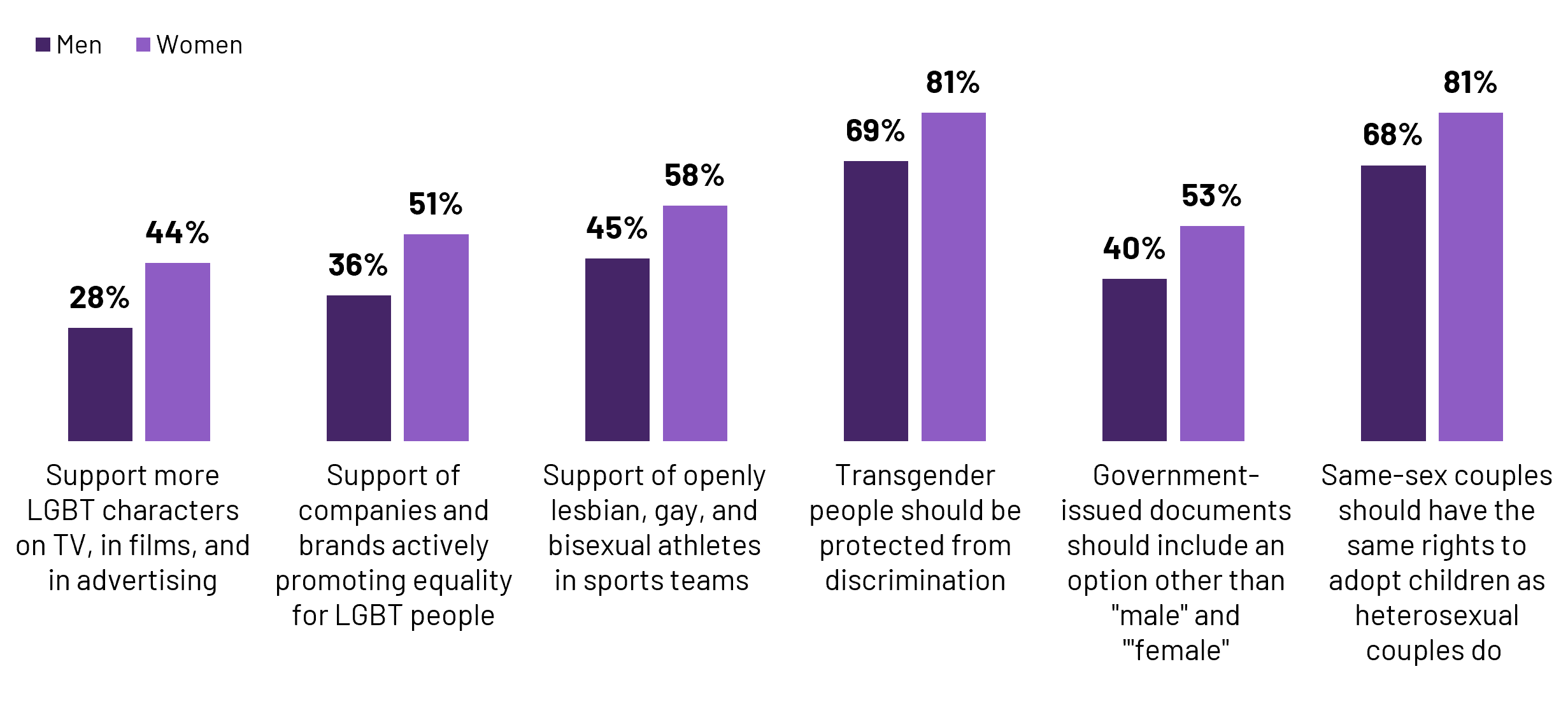Strong Majority of Canadians Continue to Support 2SLGBT+ Rights and Visibility


Most Canadians continue to agree that same-sex couples should be able to marry or have legal recognition, should have the same rights to adopt children as heterosexual couples, and that lesbian, gay, and bisexual people should be protected from discrimination. In all cases, support has directionally increased since 2024 and is far higher in Canada than the average of 26 countries covered in the poll.


Support among Canadians for various aspects of 2SLGBT+ visibility, including 2SLGBT+ characters on screen, in sports, and in public displays of affection, has shown a rebound since 2024’s declines. In contrast to last year, during which Canada tracked behind the 26-country average, Canada is now ahead of the average on all measures, especially when it comes to companies and brands actively promoting equality for 2SLGBT+ people (+10 pts).



While there have been shifts when it comes to topics related to 2SLGBT+ visibility more broadly, data related to transgender issues specifically has remained relatively consistent. A strong majority of Canadians continue to support protecting transgender people from discrimination in employment, housing, and access to businesses. On specific measures in support of transgender issues, however, Canadians continue to be more divided. Support remains lowest for health insurance coverage of gender transition, though Canadians may be warming to allowing expansive gender options for government-issued documents (+7 pts vs. 2024).

Compared to men, women hold significantly higher levels of support for all aspects of 2SLGBT+ visibility measured, with the widest gaps in support for more 2SLGBT+ representation in the media, companies actively promoting equality for 2SLGBT+ people, support for openly LGB athletes, and believing transgender people should be protected from discrimination. Additionally, more women than men see the need for alternative gender identifiers on government-issued documents, and women are also more likely than men to think same-sex couples should have equal rights to heterosexual couples when it comes to adoption.

Within this gender divide, men and women under 35 are most at odds in their perspectives regarding 2SLGBT+ visibility and equality in most cases. Whereas more than half of young women believe in greater representation of 2SLGBT+ individuals in the media, the promotion of equality for the 2SLGBT+ community by companies, and the support of openly LGB athletes, the support of young men on these same issues is limited to 40%. Support for the adoption rights of same-sex couples is 20 points higher among young women compared to men.

These are the results of a 26-country survey conducted by Ipsos on its Global Advisor online platform between Friday, April 25, and Friday, May 9, 2025. For this survey, Ipsos interviewed a total of 19,028 adults aged 18-74 in Canada, the Republic of Ireland, South Africa, Türkiye, and the United States, 20-74 in Thailand, 21-74 in Singapore, and 16-74 in all other countries. The sample consists of approximately 1,000 individuals each in Australia, Belgium, Brazil, Canada, France, Germany, Great Britain, Italy, Japan, Spain, Türkiye, and the U.S., and 500 individuals each in Argentina, Chile, Colombia, Hungary, Ireland, Mexico, the Netherlands, Peru, Poland, Singapore, South Africa, South Korea, Sweden, and Thailand. Samples in Argentina, Australia, Belgium, Canada, France, Germany, Great Britain, Hungary, Italy, Japan, the Netherlands, Poland, South Korea, Spain, Sweden, and the U.S. can be considered representative of their general adult populations under the age of 75. The “26-country average” reflects the average result for all the countries and markets where the survey was conducted. It has not been adjusted to the population size of each country or market and is not intended to suggest a total result. The precision of Ipsos online polls is calculated using a credibility interval with a poll of 1,001 accurate to +/- 3.5 percentage points and of 500 accurate to +/- 5.0 percentage points. Percentages cited may not always add to 100% or to the sum of each value due to the effects of rounding.
While the 26-country survey findings use the term “LGBT+,” in order to highlight the importance of 2S identity in Canada specifically, the group of those who self-identify as non-heterosexual and/or non-cisgender and/or non-binary gender is reported as 2SLGBT+ in Canada.
For more information on this release, please contact:
Sanyam Sethi
Vice President
Ipsos Public Affairs Canada
[email protected]
Meghan Miller
Senior Account Manager,
Ipsos Public Affairs Canada
[email protected]
Jennie Choi
Research Analyst,
Ipsos Public Affairs Canada
[email protected]

Ipsos is one of the largest market research and polling companies globally, operating in 90 markets and employing nearly 20,000 people.
Our passionately curious research professionals, analysts and scientists have built unique multi-specialist capabilities that provide true understanding and powerful insights into the actions, opinions and motivations of citizens, consumers, patients, customers or employees. Our 75 business solutions are based on primary data from our surveys, social media monitoring, and qualitative or observational techniques.
“Game Changers” – our tagline – summarizes our ambition to help our 5,000 clients navigate with confidence our rapidly changing world.
Founded in France in 1975, Ipsos has been listed on the Euronext Paris since July 1, 1999. The company is part of the SBF 120, Mid-60 indices, STOXX Europe 600 and is eligible for the Deferred Settlement Service (SRD).
http://www.ipsos.com/



